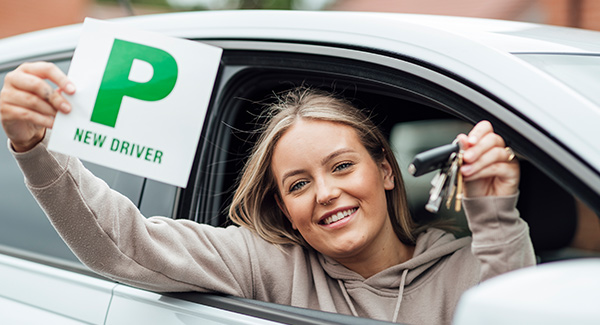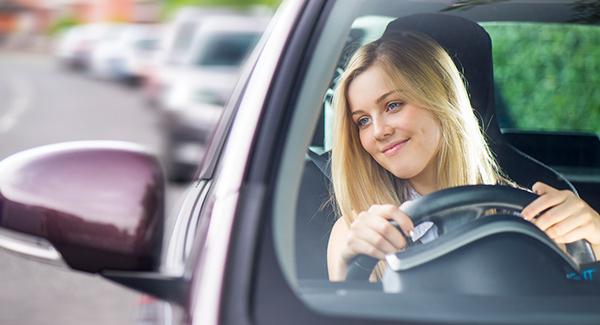Driving alone for the first time
- Editorial Team
Passing your driving test can open a world of new opportunities but driving on your own for the first time can be scary, especially when you don’t have your driving instructor by your side to guide you through the process.
Young motorists can be more at risk of having an accident, potentially due to inexperience or overconfidence. But as a new driver, there are several things you can do to prepare for driving alone which can help keep you safe on the roads.
The sooner you drive the better
While driving alone can feel intimidating, you shouldn’t let it put you off driving. The sooner you can get behind the wheel the better. If you’re feeling anxious, start off with a few shorter trips, during quieter times and build up to busier roads.
The more you can practice, the more driving will start to feel automatic and natural.
Make sure you’re comfortable with the vehicle
Before making a trip, it is vital to ensure your car is safe and comfortable to drive in. Familiarise yourself with the vehicle’s controls and how the brakes work so that you can drive safely and responsibly.
Make sure that the car seat is properly adjusted, so that your legs can comfortably reach the pedals and your back is correctly supported.
You should take the time to ensure the car mirrors are properly adjusted to allow good all-round vision.
It is also recommended to keep your fuel tank at least a quarter full to reduce the likelihood of dropping into low fuel levels if you get stuck in traffic.
Car insurance
It’s illegal to drive without valid motor insurance. You could receive a fixed penalty fine of £300 and six penalty points on your driving licence if you are caught driving a vehicle you are not insured to drive.
If the case goes to court, you could receive an unlimited fine and be disqualified from driving.
As a new driver, the cost of car insurance can be expensive. At A Choice, we can help young drivers get a competitive price on their car insurance by comparing premiums from our insurance panel and advising motorists on suitable policies.
Plan your route beforehand
Make sure you are well prepared before setting off on a journey. Plan your route in advance, so that you are less dependent on your sat nav, signs and road markings.
If you’re using a sat-nav, make sure it is updated to reflect the changes to UK roads and The Highway Code.
It’s also vital to have a good breakdown cover policy in place, should you find yourself stranded at the roadside.
‘P’ Plates
When you pass your driving test, you can no longer drive with ‘L’ plates attached to your vehicle. But you can replace them with green (probationary) ‘P’ plates instead.
Attaching ‘P’ plates to your vehicle lets other motorists know you’re a new driver. It may encourage other road users to be more considerate and give you some leeway if you make a mistake.
There is no legal requirement to display ‘P’ plates and you can keep them on your vehicle for as long as you feel necessary while you build up your confidence and on-road experience.
Driver fatigue
Avoid driving if you feel tired. Tiredness makes you less attentive, reduces your reaction times, and affects your ability to control your vehicle. If you feel tired while driving, do not complete your journey. Take a break and have a coffee, or pull over somewhere safe to have a short nap.
Don’t drive under the influence
Don’t drive if you have consumed any alcohol or taken drugs. Alcohol and drugs significantly affect your reaction times, judgement, and coordination.
Even prescribed medication can affect your ability to drive safely, so you should always read the label beforehand.
Be confident
Now that you’ve passed your test, there’s no reason why you shouldn’t feel confident about your driving. After all, your examiner wouldn’t have passed you if they did not feel you could drive safely and responsibly on your own.
Remember that even experienced drivers make mistakes. If you make an error, put it behind you, take a deep breath and focus on the road ahead.
While you should be confident in your driving ability, be aware that overconfidence can increase the risk of an incident. So always drive safely and avoid taking unnecessary risks.
Driving conditions
Driving in different weather conditions can be challenging. In bad conditions, it may be best to avoid driving completely or ask a parent or guardian to accompany you until you build up your experience.
Night-time driving also requires a different skill set. As vision is reduced at night, this can make it harder to judge speed and distance or to spot hazards. So, unless it is necessary, you may want to avoid driving at night, until you improve your driving ability.
Take your time driving
Always give yourself plenty of time to complete a journey, so that you’re not rushing around or exceeding the speed limit to make up for lost time. Exceeding the speed limit is unlikely to make much difference to your overall journey time, you will consume more fuel and put more wear and tear on your vehicle if you brake sharply.
Avoid distractions
Driver distraction involves carrying out another activity while driving, such as adjusting the radio, eating, drinking, using a mobile phone, or sat nav. It affects most drivers but can be more problematic with younger drivers due to their inexperience.
Multitasking behind the wheel can result in a loss of concentration because the driver is focused on something else. This can result in delayed reactions and increase the risk of an accident.
Even a small distraction could result in an incident. If you need to do something that is distracting you while driving, such as using your mobile phone, find a safe place to pull over first.
Declutter your car by removing any loose items that can move around and cause a distraction or get stuck under the pedals as you’re driving.
While driving alone can feel strange, driving with passengers can also cause a distraction. The last thing you need is overly talkative passengers when you’re on busy roads, or back seat drivers encouraging you to put your foot down or telling you how to drive.
Only drive with passengers that will benefit your driving. Older passengers may offer good driving advice and can often help with directions.
Switch off your mobile phone and put it somewhere out of sight, such as the glove compartment so that you’re not distracted if you receive a call or notification.
It helps to avoid playing fast tempo music as this may encourage you to drive faster. You should also keep your music at a sensible volume.
Keep in touch with someone from home
Remember that your parents may be worried or nervous about you driving on your own unsupervised. So let them know where you are going and call them when you’ve reached your destination so that they know you’re safe.
Don’t allow other motorists to intimidate you
Don’t allow yourself to feel pressured or intimidated by other drivers.
If another driver acts aggressively towards you, keep calm. Some drivers may be looking for a reaction, so try not to react or get involved in a conflict.
If the driver is driving too closely, a practice referred to as tailgating, don’t allow them to intimidate you or force you to change your driving behaviour. Stay in control of the vehicle and allow them to pass.
Do not speed up, as this will encourage the tailgater to do the same. Avoid using your brakes to irritate them or force them to slow down, as this may exacerbate the situation.
Remember, that you should always remain in the left-hand lane unless overtaking another vehicle.
Pass Plus
Pass Plus is a practical driving course that lasts around six hours. It can help new drivers gain new skills and improve their driving skills.
The course consists of six modules that cover almost every aspect of driving. These include:
- Driving in different weather conditions
- Night-time driving
- Driving on rural roads
- Motorway driving
- Dual carriageway driving
- Driving in town
There is no test, but you will be assessed throughout the course. Taking an additional driving course will help keep you safer on the roads and make driving more enjoyable.
Final thoughts
While the prospect of driving alone for the first time can be scary, after a few trips, you’ll become more comfortable and confident behind the wheel, and you should start to enjoy your driving more.
Share this article
Table of Contents
More posts
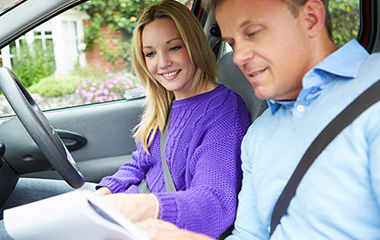
Can You Take Your Driving Test In Your Own Car | A Choice
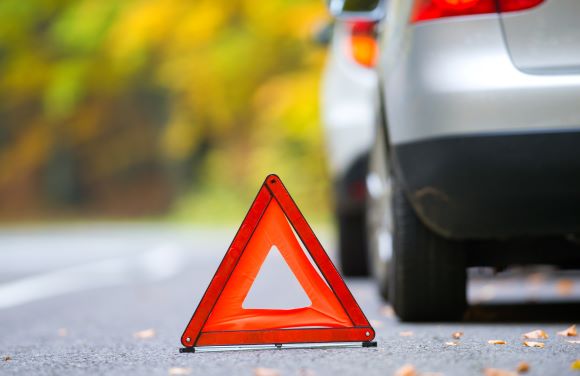
What To Do After A Car Accident | A Choice
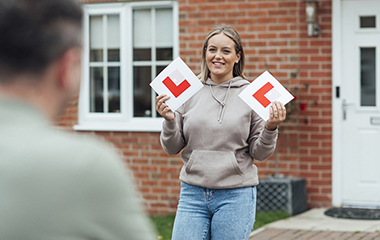
L Plates: What You Need To Know Before You Drive | A Choice
